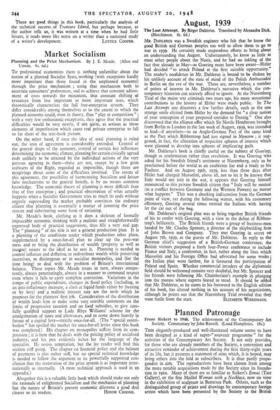August, 1939 - The Last Attempt. By Birger Dahlerus. Translated
by Alexandra Dick. (Hutchinson. 8s. 6d.) The Last Attempt. By Birger Dahlerus. Translated by Alexandra Dick. (Hutchinson. 8s. 6d.) MR. DAHLERUS was a Swedish engineer who felt that he knew the good British and German peoples too well to allow them to go to war in 1939. He certainly made stupendous efforts to bring about an understanding that August. Unfortunately, he knew as little as most other people about the Nazis, and he had no inkling of the fact that already in May—as Goering must have been aware—Hitler had decided "to attack Poland at the first suitable opportunity." The reader's confidence in Mr. Dahlerus is bound to be shaken by his unlikely account of the state of mind of the Polish Ambassador in Berlin on the eve of the war. There are, nevertheless, a number of points of interest in Mr. Dahlerus's narrative which the con- temporary historian can scarcely afford to ignore. At the Nuremberg Trial of the major war criminals two years ago, his more sensational contributions to the history of Hitler were-made public. In The Last Attempt one discovers a few further details, such as the one strange smile elicited from Hitler by the demand for "a clear notion of your conception of your proposed corridor to Danzig." One also discovered that the alliance offer which Sir Nevile Henderson brought from Berlin to London in the last week of August, 1939, was intended to lead—if anywhere—to an Anglo-German Pact of the same kind as the Pact which Ribbentrop had just signed in Moscow ; it sug- gested, in fact, the allocation of respective spheres of interest which were planned to develop into spheres of implicating guilt.
Mr. Dahlerus's book is chiefly useful on the subject of Goering, though as confirmation rather than revelation. It was Goering who asked for his Swedish friend's testimony at Nuremberg, only to be proclaimed before the world as an exuberant liar and a toady to his Fuehrer. And on August 29th, 1939, less than three days after Hitler had charged Mussolini, above all, not to let it be known that Italy would not join in the war, it appears that Goering himself announced to this private Swedish citizen that "Italy will be neutral (in a conflict between Germany and the Western Powers) no matter what happens." This was a shocking indiscretion from the German point of view, yet during the following winter, with his customary effrontery, Goering several times twitted the Italians with having let the cat out of the -bag.- Mr. Dahlerus's original plan was to bring together British friends of his to confer with Goering, with a view to the defeat of Ribben- trop's bellicosity. The British friends were a group of business-men headed by Mr. Charles Spencer, a director of the shipbuilding firm of John Brown and Company. They met Goering in secret on August 7th, 1939, as the guests of Mr. Dahlerus. In reply to the German chief's suggestion of a British-German conference, the British visitors proposed a fresh four-Power conference to include France and Italy, a conference in fact, rather along the lines which Mussolini and his Foreign Office had advocated for some weeks ; the Italian plan went farther, for it favoured the participation of Poland and Spain. Whether commercial invaders of the diplomatic field should be welcomed remains very doubtful, but Mr. Spencer and his friends were following Mr. Chamberlain's example in plunging into the morass where experts feared to tread. It should be added that Mr. Dahlerus, as he states in his foreword to the English edition of his book, has altered nothing in his account of his negotiations, although he points out that the Nuremberg Trial revealed that they


































 Previous page
Previous page